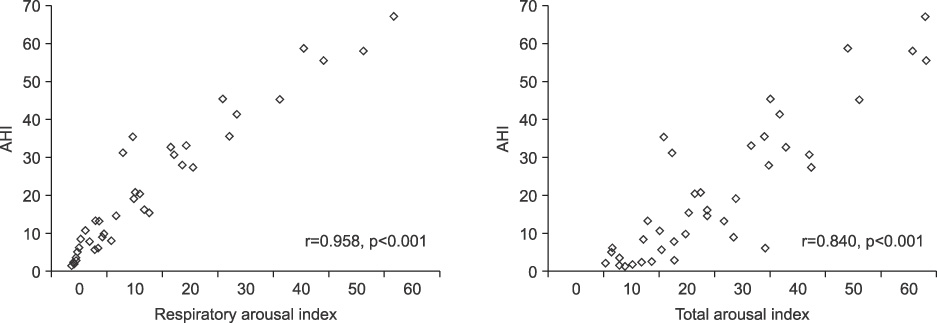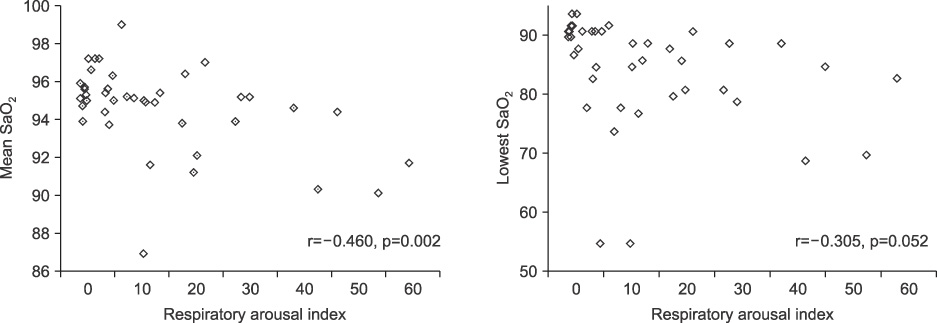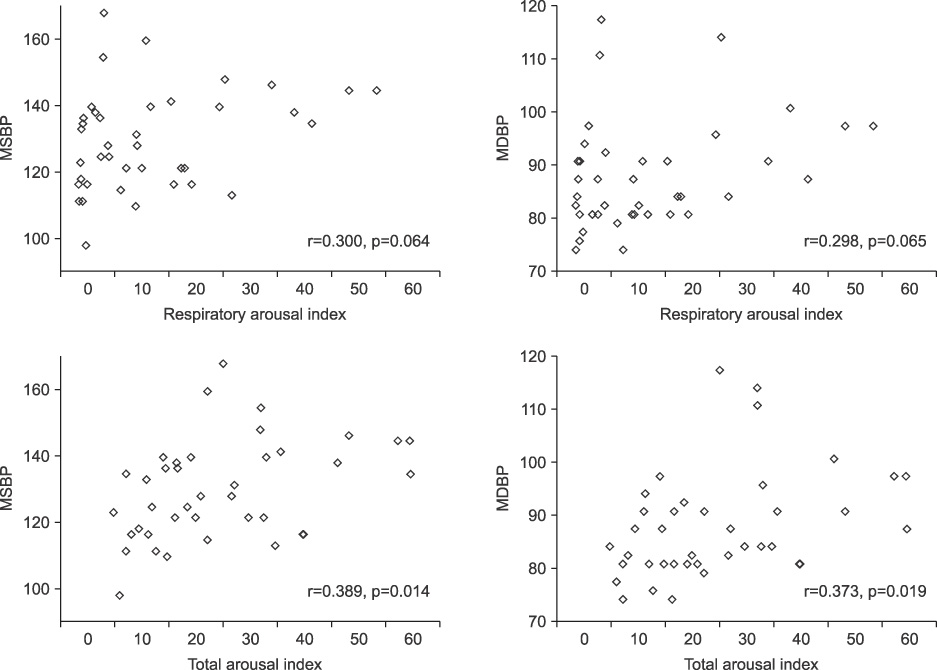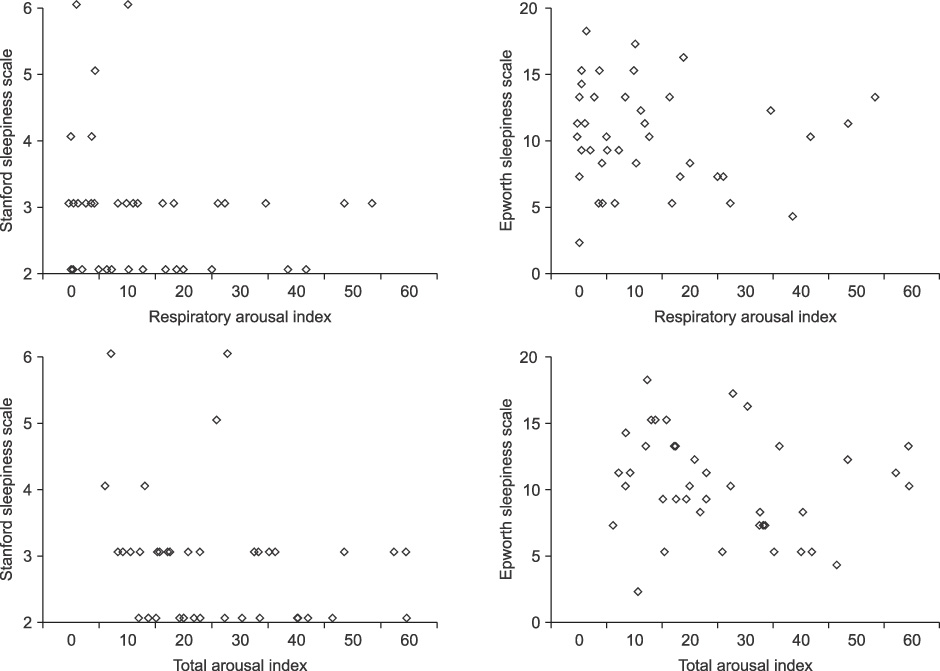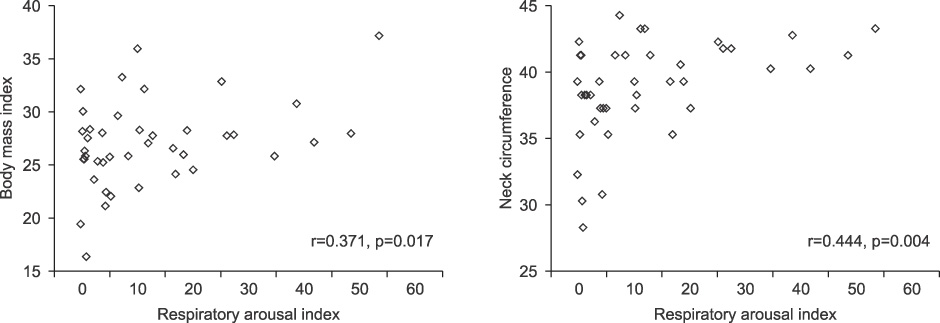Tuberc Respir Dis.
2009 Sep;67(3):183-190.
Relationship between Arousal Indices and Clinical Manifestations in Patients Who Performed Polysomnography
- Affiliations
-
- 1Department of Internal Medicine, The Catholic University of Korea College of Medicine, Seoul, Korea. hsmoon@catholic.ac.kr
Abstract
- BACKGROUND
Repeated arousals during sleep have been known to be associated with excessive daytime sleepiness and cardiovascular complications. We investigated the relationship between arousal indices and clinical parameters. METHODS: We retrospectively reviewed medical records of 41 patients who performed polysomnography for a diagnosis of obstructive sleep apnea syndrome. We defined total arousal index (TAI) as the number of arousals per hour and respiratory arousal index (RAI) as the number of arousals associated with apnea or hypopnea per hour. RESULTS: There were significant positive correlations between arousal indices and apnea-hypopnea index (AHI) (RAI vs. AHI, r=0.958, p<0.001; TAI vs. AHI, r=0.840, p<0.001). RAI and mean oxygen saturation showed a significant negative correlation with each other (r=-0.460, p=0.002). TAI revealed a significant positive correlation with mean systolic blood pressure (MSBP) and mean diastolic blood pressure (MDBP) (TAI vs. MSBP, r=0.389, p=0.014; TAI vs. MDBP, r=0.373, p=0.019). There was no significant correlation between arousal indices and parameters of sleepiness. RAI had a significant positive correlation with body mass index (BMI) and neck circumference (NC) (RAI vs. BMI, r=0.371, p=0.017; RAI vs. NC, r=0.444, p=0.004). When partial correlation analysis was performed to adjust for other variables, there was significant correlation between RAI and AHI (r=0.935, p<0.001). CONCLUSION: This study shows that respiratory arousal index could be a useful index reflecting of severity of obstructive sleep apnea syndrome. Arousal during sleep would be concerned in the development of cardiovascular complication of obstructive sleep apnea. And some anthropometric factors would contribute to the development of arousals during sleep. Further studies are needed to clarify any cause-effect relationship.
Keyword
MeSH Terms
Figure
Reference
-
1. Cherniack NS. Sleep apnea and its causes. J Clin Invest. 1984. 73:1501–1506.2. Phillips B, Cook Y, Schmitt F, Berry D. Sleep apnea: prevalence of risk factors in a general population. South Med J. 1989. 82:1090–1092.3. Block AJ, Boysen PG, Wynne JW, Hunt LA. Sleep apnea, hypopnea and oxygen desaturation in normal subjects: a strong male predominance. N Engl J Med. 1979. 300:513–517.4. Ancoli-Israel S. Epidemiology of sleep disorders. Clin Geriatr Med. 1989. 5:347–362.5. Chervin RD, Guilleminault C. Obstructive sleep apnea and related disorders. Neurol Clin. 1996. 14:583–609.6. Loredo JS, Ziegler MG, Ancoli-Israel S, Clausen JL, Dimsdale JE. Relationship of arousals from sleep to sympathetic nervous system activity and BP in obstructive sleep apnea. Chest. 1999. 116:655–659.7. Yoon IY, Jeong DU. Degree of arousal is most correlated with blood pressure reactivity during sleep in obstructive sleep apnea. J Korean Med Sci. 2001. 16:707–711.8. Kingshott RN, Engleman HM, Deary IJ, Douglas NJ. Does arousal frequency predict daytime function? Eur Respir J. 1998. 12:1264–1270.9. Stepanski EJ. The effect of sleep fragmentation on daytime function. Sleep. 2002. 12:268–276.10. Sleep Disorders Atlas Task Force of the American Sleep Disorders Association. EEG arousals: scoring rules and examples. Sleep. 1992. 15:173–184.11. Rechischaffen A, Kales A. A manual of standardized terminology, techniques and scoring system for sleep stages of human subjects. 1968. Los Angeles: Brain information service/brain research institute, University of California Los Angeles.12. Iber C, Ancoli-Israel S, Chesson A, Quan SF. The AASM manual for the scoring of sleep and associated events: rules, terminology and technical specifications. 2007. 1st ed. Westchester: American Academy of Sleep Medicine.13. Johns MW. A new method for measuring daytime sleepiness: the Epworth sleepiness scale. Sleep. 1991. 14:540–545.14. Hoddes E, Zarcone V, Smythe H, Phillips R, Dement WC. Quantification of sleepiness: a new approach. Psychophysiology. 1973. 10:431–436.15. Cheshire K, Engleman H, Deary I, Shapiro C, Douglas NJ. Factors impairing daytime performance in patients with sleep apnea hypopnea syndrome. Arch Intern Med. 1992. 152:538–541.16. Collard P, Dury M, Delguste P, Aubert G, Rodenstein DO. Movement arousals and sleep-related disordered breathing in adults. Am J Respir Crit Care Med. 1996. 154:454–459.17. Tsai WH, Flemons WW, Whitelaw WA, Remmers JE. A comparison of apnea-hypopnea indices derived from different definitions of hypopnea. Am J Respir Crit Care Med. 1999. 159:43–48.18. Pang KP, Terris DJ, Podolsky R. Severity of obstructive sleep apnea: correlation with clinical examination and patient perception. Otolaryngol Head Neck Surg. 2006. 135:555–560.19. Lam JC, Xu A, Tam S, Khong PI, Yao TJ, Lam DC, et al. Hypoadiponectinemia is related to sympathetic activation and severity of obstructive sleep apnea. Sleep. 2008. 31:1721–1727.20. Veasey SC. Obstructive sleep apnea: re-evaluating our index of severity. Sleep Med. 2006. 7:5–6.21. Ruehland WR, Rochford PD, O'Donoghue FJ, Pierce RJ, Singh P, Thornton AT. The new AASM criteria for scoring hypopneas: impact on the apnea hypopnea index. Sleep. 2009. 32:150–157.22. Loredo JS, Clausen JL, Ancoli-Israel S, Dimsdale JE. Night-to-night arousal variability and interscorer reliability of arousal measurements. Sleep. 1999. 22:916–920.23. Drinnan MJ, Murray A, Griffiths CJ, Gibson GJ. Interobserver variability in recognizing arousal in respiratory sleep disorders. Am J Respir Crit Care Med. 1998. 158:358–362.24. Berry RB, Gleeson K. Respiratory arousal from sleep: mechanisms and significance. Sleep. 1997. 20:654–675.25. Sulit L, Storfer-Isser A, Kirchner HL, Redline S. Differences in polysomnography predictors for hypertension and impaired glucose tolerance. Sleep. 2006. 29:777–783.26. Worsnop CJ, Pierce RJ, Naughton M. Systemic hypertension and obstructive sleep apnea. Sleep. 1993. 16:S148–S149.27. Fletcher EC. Sympathetic over activity in the etiology of hypertension of obstructive sleep apnea. Sleep. 2003. 26:15–19.28. Goncalves MA, Paiva T, Ramos E, Guilleminault C. Obstructive sleep apnea syndrome, sleepiness, and quality of life. Chest. 2004. 125:2091–2096.29. Lee SK, Kim SW, Lee YC, Kim SH, Eun YG, Cho JS. Difference of polysomnographic, anthropometric, physical and radiologic findings in an obstructive sleep apnea syndrome patient with excessive daytime sleepiness. J Rhinol. 2008. 15:55–61.30. Kingshott RN, Engleman HM, Deary IJ, Douglas NJ. Does arousal frequency predict daytime function? Eur Respir J. 1998. 12:1264–1270.31. Mediano O, Barceló A, de la Peña M, Gozal D, Agustí A, Barbé F. Daytime sleepiness and polysomnographic variables in sleep apnoea patients. Eur Respir J. 2007. 30:110–113.32. Weaver EM, Kapur V, Yueh B. Polysomnography vs self-reported measures in patients with sleep apnea. Arch Otolaryngol Head Neck Surg. 2004. 130:453–458.33. Ferguson KA, Ono T, Lowe AA, Ryan CF, Fleetham JA. The relationship between obesity and craniofacial structure in obstructive sleep apnea. Chest. 1995. 108:375–381.34. Sakakibara H, Tong M, Matsushita K, Hirata M, Konishi Y, Suetsugu S. Cephalometric abnormalities in nonobese and obese patients with obstructive sleep apnoea. Eur Respir J. 1999. 13:403–410.
- Full Text Links
- Actions
-
Cited
- CITED
-
- Close
- Share
- Similar articles
-
- Correlation between Quality of Life and Indices of Polysomnography in Children with Obstructive Sleep Apnea Syndrome
- Study on Correlations among Polysomnogram Indices for Obstructive Sleep Apnea-Hypopnea Patients
- Parasomnia Overlap Disorder Associated With Pontine Glioblastoma
- Gender Differences in the Polysomnographic Findings among Obstructive Sleep Apnea Patients
- The Changes of Polysomnographic Indices after Adenotonsillectomy in Pediatric Obstructive Sleep Apnea Syndrome

